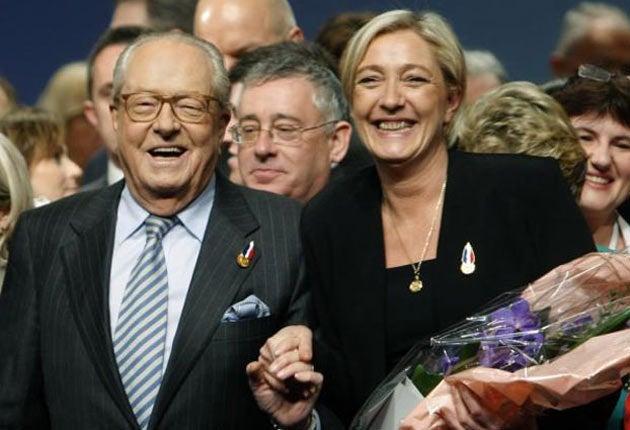Like father, like daughter: French far right keeps things in the family
Marine Le Pen is elected leader of the National Front and vows to 'renew' the party

The French far right gave itself a modern, attractive new leader yesterday, threatening to scramble all forecasts for an already unpredictable presidential election next year.
Members of the ultra-nationalist National Front voted overwhelmingly – by 67.7 per cent to 32.3 per cent – to replace their retiring founder-president Jean-Marie Le Pen, 82, with his daughter Marine, who has promised to lead the party away from provocation and dissent and into power.
New opinion polls suggested that Marine, 42, who is not necessarily more moderate than her father but more focused on the anxieties of alienated, younger, white voters, could score between 16 and 18 per cent in the first round of the presidential elections next spring. This could be enough to repeat her father's exploit of April 2002 and put her into the second-round run-off next May, against either President Nicolas Sarkozy or an as yet unknown candidate of the centre-left.
In an inaugural speech to her party's conference in Tours yesterday, Ms Le Pen said she would "renew" the NF and make it into "a powerful instrument" for the "conquest of power" to reverse the "social Tsunami and moral Chernobyl" of globalisation.
However, a large section of the NF and the wider, xenophobic ultra-right in France remains hostile to her approach and style. As a twice-divorced, single mother of three who talks of "modernising" and "de-demonising" the NF, they fear she secretly despises the traditionalist, ultra-Catholic or ultra-patriotic values which her father founded the party to defend in 1972.
A possible anti-Marine split was threatened yesterday with the resignation of one of the NF's founding, elder statesmen. The extreme nationalist and Vichy-apologist, Roger Holeindre, 81, said: "I am going because Marine Le Pen does not represent what I stand for – nor what her father stands for. She does not give a damn for the last 50 years of French history."
Bruno Gollnisch, her father's long-time deputy and the defeated candidate of the party's traditionalist wing, said he would remain within the NF but refused to be Ms Le Pen's deputy.
Mr Holeindre's comments encapsulate the difference between father and daughter. Mr Le Pen has always appeared more obsessed with rewinding the ideological battles of the Second World War and the Algerian war of independence than gaining power or offering France a different way forward.
In his farewell speech on Saturday, he recalled his many provocations and said that he did not regret any of them. His references to the gas chambers as "a detail" of the Second World War and cryptic references to "inequalities" between races had been, he said, a way of challenging the suffocating power of "received political ideas".
Even on his last day in office, Mr Le Pen could not resist one final anti-semitic provocation. He said of a TV journalist manhandled out of a private meeting: "(He) believed it was necessary to say that it was because he was Jewish that he was thrown out. That couldn't be seen either on his (press) card or on his nose."
Marine Le Pen is impatient with her father's approach. She believes the ideas of the French, and European, ultra-right – anti-immigrant, anti-Europe, anti-Islam, anti-globalisation – are now ripe for electoral success. In an interview with The Independent in September, she said that, faced with German victory in 1940, she would have supported General Charles de Gaulle's Free French in London rather than the Nazi-collaborating regime of Marshal Philippe Pétain in Vichy. In her speech yesterday she said that the NF – partly composed of Vichy apologists – was now the "true French Resistance".
Ms Le Pen's rise has already caused anxiety in the Elysée Palace. President Sarkozy is said to explain his swing to the authoritarian right last summer – especially the campaign against Roma immigrants from eastern Europe – as the necessity to block Ms Le Pen's rise.
French political commentators say that Ms Le Pen – excellent on television and difficult to dislike – could make inroads into both the centre-right and centre-left vote. The lingering recession, problems of the euro, hatred of global financial markets, and fear of Islam are all fertile ground for NF ideas.
Commentators also point out, however, that Ms Le Pen inherits a divided and impecunious party with few talented senior figures. She may well threaten a first-round upset in 2012 but will not win the presidency. After that, they say she may find it hard to prevent the NF from falling apart.
Subscribe to Independent Premium to bookmark this article
Want to bookmark your favourite articles and stories to read or reference later? Start your Independent Premium subscription today.

Join our commenting forum
Join thought-provoking conversations, follow other Independent readers and see their replies